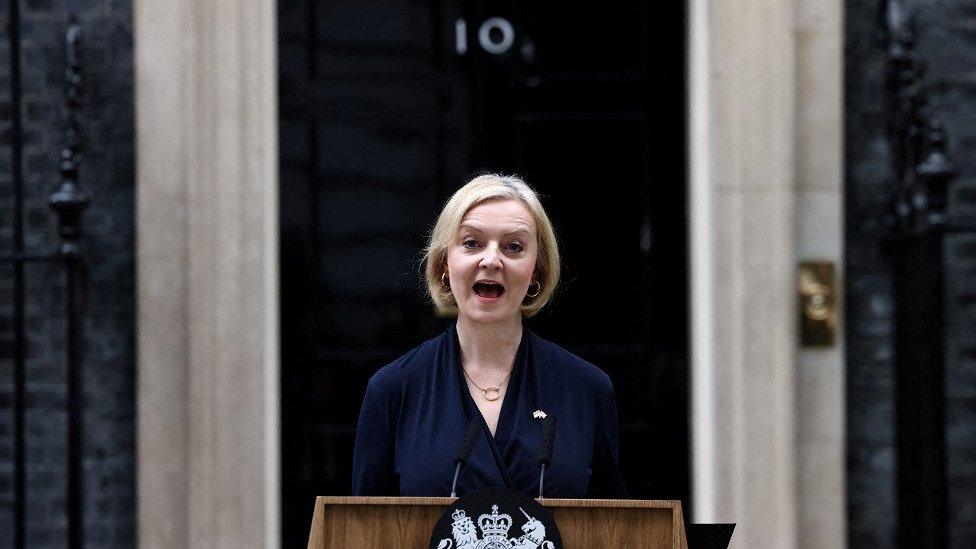Liz Truss: I don't want to be prime minister again
- Published
Watch: Liz Truss on whether or not she wants to be PM again
Liz Truss has ruled out running as prime minister again, in her first interview since resigning.
In an interview for the Spectator magazine, the former PM admitted she made mistakes but defended her time in office and vowed to continue as an MP.
She said she will support Rishi Sunak as prime minister.
Ms Truss's government lasted just seven weeks after its mini-budget spooked financial markets, prompting Tory MPs to force her resignation.
She became the shortest-serving prime minister in UK history, spending only 49 days in office.
Speaking to Spectator Editor Fraser Nelson and Katy Balls, the magazine's new political editor, Ms Truss admitted her premiership was "tough" but she "just sort of got on with it".
"I went in with a very clear agenda about what we needed to deliver," she said, but "events took place which I wasn't expecting".
The mini-budget, which included a £45bn package of tax cuts, would have been scaled back if she had been warned about fragility in a section of the pensions market that was heavily tied to government bonds, Ms Truss said.
She blamed Treasury officials for not warning her or her Chancellor Kwasi Kwarteng that "problems in the bond market preceded the mini-budget".
"Our assumption was that we'd worked up these plans with Treasury officials and if there had been a major problem it would have been flagged to us," she said.

Asked directly if she wanted to be prime minister again she said "no", adding "I'm not desperate to get back into Number 10".
But asked if she regretted being prime minister she said "no, I don't regret it".
Amid the fallout from the mini-budget, the Bank of England announced it was increasing the UK's base interest rate by 0.5 percentage points, to 2.25%.
It caused mortgage rates to surge to a 14-year high - breaching 6% for the first time since the 2008 financial crisis.
"I don't think it's fair to blame interest rate rises on what we did," she said, citing global factors.
Ms Truss said she still counts Mr Kwarteng, who she sacked at the height of the economic turmoil, as a friend.
After replacing Mr Kwarteng as chancellor with Jeremy Hunt after just 38 days in the role, Ms Truss said she realised "it was difficult for me to continue" as prime minister.
Pro-growth agenda
Ms Truss admitted that with hindsight, she may have made different decisions but argued her policies would have increased growth and brought down debt.
But she said her arguments that low taxes "drive economic growth that will benefit everybody" did not "fall on particularly fertile ground" at the Treasury.
Ms Truss said she would now focus on "building a strong intellectual base" for the "pro-growth agenda" she started in office.
The interview follows a 4,000-word essay in the Sunday Telegraph, external, where Ms Truss claimed her plans were brought down by what she called "the left-wing economic establishment".
Labour leader Sir Keir Starmer said his "heart sunk" when he read Ms Truss' article.
"The former prime minister's contest of who was the biggest failure is just about the last thing that this country needs right now," Sir Keir said.
Mr Sunak's official spokesman said the prime minister "will always listen to views of former prime ministers" and that it is "healthy to have a diverse debate".
But Tory MP Caroline Nokes said "a period of silence would be helpful" from Ms Truss.